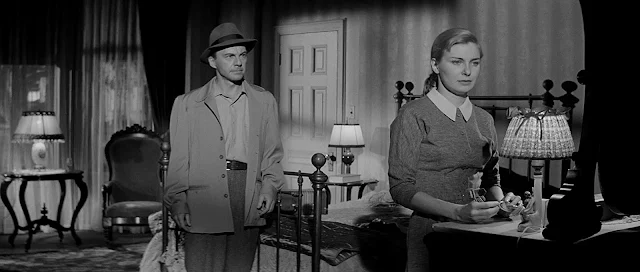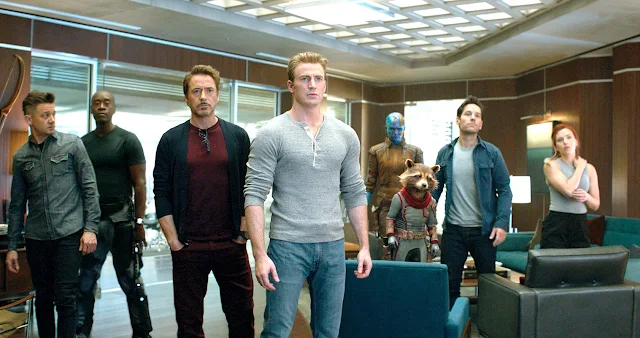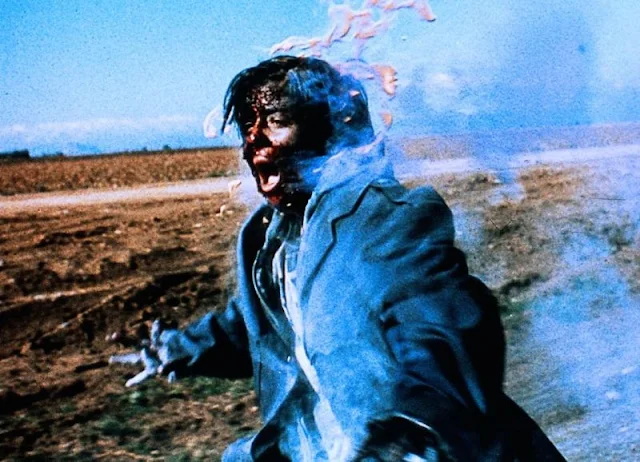A blog formerly known as Bookishness / By Charles Matthews
"Dazzled by so many and such marvelous inventions, the people of Macondo ... became indignant over the living images that the prosperous merchant Bruno Crespi projected in the theater with the lion-head ticket windows, for a character who had died and was buried in one film and for whose misfortune tears had been shed would reappear alive and transformed into an Arab in the next one. The audience, who had paid two cents apiece to share the difficulties of the actors, would not tolerate that outlandish fraud and they broke up the seats. The mayor, at the urging of Bruno Crespi, explained in a proclamation that the cinema was a machine of illusions that did not merit the emotional outbursts of the audience. With that discouraging explanation many ... decided not to return to the movies, considering that they already had too many troubles of their own to weep over the acted-out misfortunes of imaginary beings."--Gabriel García Márquez, One Hundred Years of Solitude
Search This Blog
Saturday, November 30, 2019
The Three Faces of Eve (Nunnally Johnson, 1957)
The Three Faces of Eve (Nunnally Johnson, 1957)
Cast: Joanne Woodward, David Wayne, Lee J. Cobb, Edwin Jerome, Alena Murray, Nancy Kulp, Douglas Spencer, Terry Ann Ross, Ken Scott, Mimi Gibson, Alistair Cooke. Screenplay: Nunnally Johnson, based on a book by Corbett Thigpen and Hervey M. Cleckley. Cinematography: Stanley Cortez. Art direction: Herman A. Blumenthal, Lyle R. Wheeler. Film editing: Marjorie Fowler. Music: Robert Emmett Dolan.
When cases of what was then called "multiple personality disorder" were first diagnosed and made known to the public, it was a godsend to actors, who could then show off their skills in three-or-more-in-one roles. Playing "Eve White," "Eve Black," and "Jane" in The Three Faces of Eve launched Joanne Woodward's film career and won her a best actress Oscar. Later, it would give Sally Field a chance to play more than a dozen characters in the TV movie Sibyl (Daniel Petrie, 1976), earning her an Emmy and helping her break out of the "manic pixie dream girl" type that she had been stuck in after the TV series Gidget and The Flying Nun. (Sibyl's producers also indulged in the stunt-casting of Woodward as Sibyl's psychiatrist.) Today the disorder is more usually known as "dissociative identity," and it still stirs controversy in psychoanalytic circles, with some questioning whether it really arises from childhood trauma like the ones portrayed in The Three Faces of Eve and Sibyl, and even if it might be induced by the psychiatrist's own techniques in treating patients. That is to say, despite the attempts -- which include a sober-faced introduction in which Alistair Cooke solemnly asserts that the film is a "true story" -- by The Three Faces of Eve to present its narrative as a sort of docudrama, the movie needs to be met with a lot of skepticism. That doesn't deny, of course, that Woodward gives a terrific performance, carefully segueing from one Eve to another and eventually to Jane. And I liked Stanley Cortez's manipulation of shadows in filming the story -- though it's not a movie that needed to be in CinemaScope, always something of a distraction in black-and-white. But what may make Woodward's performance stand out even more is its contrast with the hamming of David Wayne as Eve's violent hick husband, a man almost as much in need of a shrink as she is. And Lee J. Cobb is uncommonly bullying as Eve's doctor, constantly sucking on a cigar as if invoking Sigmund Freud. We have a happy ending, of course, despite the fact that the real "Eve," Christine Costner Sizemore, led an anxious and troubled later life, at one point suing 20th Century Fox over a contract that deprived her of the rights to her own story.
Friday, November 29, 2019
Avengers: Endgame (Anthony Russo, Joe Russo, 2019)
Avengers: Endgame (Anthony Russo, Joe Russo, 2019)
Cast: Robert Downey Jr., Chris Evans, Mark Ruffalo, Chris Hemsworth, Scarlett Johansson, Jeremy Renner, Don Cheadle, Paul Rudd, Karen Gillan, Josh Brolin. Screenplay: Christopher Markus, Stephen McFeely. Cinematography: Trent Opaloch. Production design: Charles Wood. Film editing: Jeffrey Ford, Matthew Schmidt. Music: Alan Silvestri.
Back in September, I had this to say about Aquaman (James Wan, 2018):
"I sometimes feel with the comic-book-sourced superhero movie that we have moved not just into a separate genre but into an entirely separate medium: a fusion of video games, technology, and neo-mythology that's something other than traditional cinematic storytelling."A few weeks later, Martin Scorsese said much the same thing:
“I don’t see them. I tried, you know? But that’s not cinema,” Scorsese told Empire magazine. “Honestly, the closest I can think of them, as well made as they are, with actors doing the best they can under the circumstances, is theme parks. It isn’t the cinema of human beings trying to convey emotional, psychological experiences to another human being.”
I bring this up not to express some sort of solidarity with Scorsese, or to try to boast that I said it first, especially since Scorsese's remarks have been bouncing around the internet ever after. It should be pretty apparent from the films that I write about in this blog that my interests are centered largely in "the cinema of human beings," in Scorsese's phrase. But I think, too, that there's a place for movies like the ones Scorsese seems to be excluding from the canon of cinema. And I bring this up because last night I was faced with a choice: I could watch Scorsese's The Irishman on Netflix, or Avengers: Endgame on Disney+, to which a family member subscribes and had given me her password.
I chose Avengers: Endgame because I was tired and full of Thanksgiving dinner, and I wanted to give Scorsese's movie my full attention. I also knew that there would be no surprises in the movie I chose to watch instead: There would be familiar characters, some jokes, some emotional moments, and lots and lots of action. I would not have to think, to puzzle out motives, to try to place the film in the canon of its auteur.
And I was happy with my choice. I was entertained by actors doing fine work in their métier, with bright and colorful action, with a few sci-fi conundrums about time travel. I enjoyed seeing characters from other Marvel movies come together in new combinations. I was pleased with the richness of the casting -- dazzled, in short, by so many handsome stars. I turned off the movie relaxed and satisfied.
Will I think about Avengers: Endgame and want to see it again? Probably not. Certainly not in the way I will think about and perhaps rewatch Carlos Reygadas's Japón, Hirokazu Koreeda's The Third Murder, Julián Hernández's Raging Sun, Raging Sky, or even Otto Preminger's The Man With the Golden Arm, to name some of the works from the "cinema of human beings" I've seen and written about recently. But that doesn't mean that blockbuster movies, the ones that cost and make millions of dollars and are seen by millions of people around the world, are unworthy of my attention. It's just that they serve a different need, they speak to a different part of the soul.
The Hucksters (Jack Conway, 1947)
The Hucksters (Jack Conway, 1947)
Cast: Clark Gable, Deborah Kerr, Sydney Greenstreet, Adolphe Menjou, Ava Gardner, Keenan Wynn, Edward Arnold, Aubrey Mather, Richard Gaines. Screenplay: Luther Davis, Edward Chodorov, George Wells, based on a novel by Frederic Wakeman. Cinematography: Harold Rosson. Art direction: Cedric Gibbons, Urie McCleary. Film editing: Frank Sullivan. Music: Lennie Hayton.
The Hucksters was made in the era depicted in Mad Men, when men who had served in World War II were returning to their civilian jobs. In the advertising business, that included men like Don Draper in the TV series and Victor Norman in the movie, men whose wartime experience had toughened them and given them a fresh angle on the business of selling to the postwar clientele. If Mad Men seems to us to have a more reliable point of view than The Hucksters on that business, it's partly because hindsight is keener than the contemporary view, but also because popular entertainment is less tight-assed now. Frederic Wakeman's novel was a bestseller in part because it was frank about the sex lives of its characters, which movies in the Production Code era couldn't be. So Gable's Victor Norman is turned into a more buttoned-up character than Jon Hamm's Don Draper, but censorship especially worked to a disadvantage for Deborah Kerr, in her first American film. Kerr is forced to be chaste and prim -- characteristics that would type her in the movies until 1953, when Fred Zinnemann finally allowed her to have a sex life in From Here to Eternity. Kerr's character may agree to go away for a weekend with Vic, but only after she's assured that they will have separate rooms at opposite ends of the hotel. And when she discovers that they instead have adjoining rooms with a connecting door, she bolts. The effect on the movie is to sap any chemistry that MGM might have hoped Gable and Kerr would have. In contrast, Gable and Ava Gardner, as one of Vic's old girlfriends, strike fire immediately, which makes the ending of the movie, in which Gable's and Kerr's characters wind up together, feel phony. The Hucksters, coming a year after her breakthrough performance in Robert Siodmak's The Killers, helped make Gardner a star. Kerr had to muddle through in costume parts in movies like Quo Vadis (Mervyn LeRoy, 1951) and The Prisoner of Zenda (Richard Thorpe, 1952) before finally getting a chance to be sexy. There is some zippy dialogue in the movie, and the hits on the advertising business are often funny, but the only real reason to see The Hucksters today is to watch some skillful old character actors like Adolphe Menjou and especially Sydney Greenstreet do their thing. Greenstreet plays an imperious soap manufacturer sponsor with non-negotiable ideas about what his commercials should be, and likes to intimidate his advertising clients by doing things like hocking a loogie on the conference table to get their attention. If the film had stuck with the ad biz and not strayed off into tiresomely predictable romance, it might have been a classic, or at least a lot better.
Wednesday, November 27, 2019
Japón (Carlos Reygadas, 2002)
Japón (Carlos Reygadas, 2002)
Cast: Alejandro Ferretis, Magdalena Flores, Yolanda Villa, Martín Serrano, Rolando Hernández, Bernabe Pérez, Fernando Benítez. Screenplay: Carlos Reygadas. Cinematography: Diego Martínez Vignatti, Thierry Tronchet. Production design: Elsa Díaz, Alejandro Reygadas. Film editing: Daniel Melguizo, Carlos Serrano Azcona, David Torres.
Japón, Carlos Reygadas's first feature film, is the essential "a stranger comes to town" fable. The stranger in this case is a man in his 50s, with a hawklike and impassive face, who walks with a limp. He has come from the city to a remote village in a mountainous region of the Mexican state of Hidalgo where he plans to kill himself. He finds lodging with Ascen, an elderly widow, devoutly religious. And then the story follows the usual pattern of mutual discovery, as she explores his values -- he's a painter who has carried with him an art book and he listens to music on a portable disc player -- and he grows involved with her struggle with a greedy nephew who has laid claim to the very stones from which her house is built. He finds after all that he can't bring himself to commit suicide, but he asks a favor of her before he moves on: He wants to have sex with her. It's an astonishing request even in a film full of audacious moments, and Reygadas follows through with an equally astonishing scene of their copulation, in which Ascen submits to his request with a stoic tenderness and he breaks down in tears. Even more astonishing, the scene follows not long after an earlier one in which a gang of schoolboys interrupt their soccer game to laugh at the mating of two horses. The effect is to defuse any frivolous voyeuristic responses we may have to watching the love-making of the aging couple. Reygadas fills his film with such challenging moments, which take the viewer to task for assumptions we may make about what's happening on screen, especially since the cruelties and harshness of the setting are so alien to the typical film-watcher. It's sometimes a self-conscious film, too. At one moment, we watch a gang of workers getting drunk after having torn down Ascen's house, and we hear one of the men say they should save some of what they're drinking for the people making the film. The scene was evidently improvised, and the remark came from one of the non-professional actors in the scene, but Reygadas clearly chose to leave it in the finished film. The use of the wide CinemaScope screen is effective, too, in keeping the viewer alert, for Reygadas often teases us, keeping elements of the scene just out of the camera's range. The soundtrack is alive with the sounds of insects and animals and birds, but sometimes goes silent to startle the viewer into attention. In short, we're in the hands of a master of the medium.
Tuesday, November 26, 2019
Cleopatra (Charles L. Gaskill, 1912)
Cleopatra (Charles L. Gaskill, 1912)
Cast: Helen Gardner, Charles Sindelar, Mr. Howard, Pearl Sindelar, Miss Fielding, Miss Robson, Helene Costello, James R. Waite, Mr. Osborne, Harry Knowles, Mr. Paul, Mr. Brady, Mr. Corker. Screenplay: Charles L. Gaskill, based on a play by Victorien Sardou. Cinematography: Lucien Tainguy. Art direction: Arthur Courbault. Film editing: Helen Gardner.
D.W. Giffith's The Birth of a Nation is, judged by its racism, an odious film, but to appreciate why it's also a cinematic landmark you have to see films like the 1912 Cleopatra, produced by its star, Helen Gardner. Although Cleopatra tells its familiar story well, it never comes off the screen the way Griffith's did. Where The Birth of a Nation is fill of action and movement and suspenseful cutting, Cleopatra is static: When her ship arrives at Actium, it's a stage ship pulled into frame from stage left, and when it departs it moves off stage right. There is a rudimentary attempt at montage late in the film to serve as an account of the defeat of Mark Antony by Octavius, but for the most part Cleopatra is a series of tableaus in which the actors gather in cramped compositions around its star. Gardner was in her late 20s when the film was made, but she's a rather matronly Cleopatra, owing in part to the costumes that fail to provide her with a waist. She brings a set of stock gestures from her work on the stage, throwing her arms into the air to express every emotion from desire to dismay. Since most of their loving takes place without benefit of closeups, there's no chemistry to be found in her scenes with her handsome but wooden Antony, Charles Sindelar. Nevertheless, Cleopatra deserves to be regarded a landmark, too, as one of the first feature-length films made in America. Gardner was also a pioneer, apparently the first woman to form her own production company, thereby paving the way for stars like Mary Pickford and Gloria Swanson.
Monday, November 25, 2019
Near Dark (Kathryn Bigelow, 1987)
Near Dark (Kathryn Bigelow, 1987)
Cast: Adrian Pasdar, Jenny Wright, Lance Henriksen, Bill Paxton, Jenette Goldstein, Tim Thomerson, Joshua John Miller, Marcie Leeds. Screenplay: Kathryn Bigelow, Eric Red. Cinematography: Adam Greenberg. Production design: Stephen Altman. Film editing: Howard E. Smith. Music: Tangerine Dream.
I didn't think I ever wanted to see another vampire movie. And after No Country for Old Men (Joel Coen, Ethan Coen, 2007) and Hell or High Water (David Mackenzie, 2016), I was feeling a little burned out on the neo-Western genre. So a film like Near Dark that combines both was a little out of my range of immediate interests. But Kathryn Bigelow's name drew me in, and it was also a chance to see a performance I had missed by one of my favorite actors, the late and very lamented Bill Paxton. I wasn't disappointed. Bigelow has a way of making even the most generic subjects interesting. She's a little like Hitchcock in her ability to keep you on edge and to create characters that make you root against your own interests. Her vampires are objectively a vicious, grungy lot, and yet you almost root for them when they're under siege, in danger of being forced into the lethal sunlight, just as you somehow sympathetically root for Hitchcock's villains like Norman Bates to get away with it. It's also a well-cast movie, with a young and very pretty Adrian Pasdar as the imperiled mortal, and Paxton doing his showboating best as the most flamboyant vampire. This was in a period when Bigelow was involved with James Cameron, so Paxton, Lance Henriksen, and Jenette Goldstein came over from the cast of his Aliens, released a year earlier and given a plug on a theater marquee in the background of one shot.
Subscribe to:
Comments (Atom)




















































